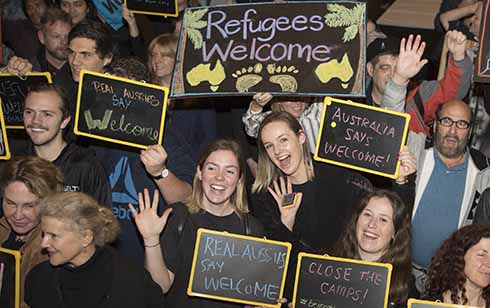 As individuals each of us has the opportunity to enter into the next six months with a revised vision for what we hope to achieve and who we would like ourselves to be.
As individuals each of us has the opportunity to enter into the next six months with a revised vision for what we hope to achieve and who we would like ourselves to be.
As a community we consider what might be achieved collectively between now and the end of the year and the plans that might be implemented and may bear fruit next year. As a society we enter into a new financial year and at all levels pause to consider what we might be able to achieve with the gifts provided by our resources and collective ‘hard work’.
Reflection and discernment are greatly needed in our country. Last week our government rejected recommendations by the Australian Human Rights Commission to relax a number of draconian and retrospective laws that affect some 30,000 asylum seekers. Many of the laws in place affect the ability for these vulnerable people to seek employment and contribute to the economy, to be able to live above the poverty line, to access elementary health services and have a hopefully vision of the future.
WELFARE CUTS
As we enter into a new financial year our government has continued to slash the funds offered to support people seeking asylum. There has been a 60% reduction in the budget in this area over the past two years, which in the coming year will equate to about $30,724 per person being offered to support employment services, ‘welfare’ payments etc.
Conversely, border protection and offshore detention blew out to $1.158 billion in 2018-19. Meaning that the cost of offshore detention was $1.266 millon per person. The enormous discrepancy in the cost of detaining asylum seekers and refugees offshore and the limited funding offered to support those in our communities is difficult to resolve.
These facts are part of an extremely difficult and emotive issue. However, the cost to our collective humanity and the wellbeing of vulnerable human beings cannot be summarily dismissed. The psychological stress on those affected is inordinate. Without hope people become despondent and lost. This eventuality leads to significant mental health problems and suicide (24 cases since 2010).
PEOPLE OF HOPE
As a community we are a people of hope. Our vision is centered on the teachings of Jesus, his resurrection and the promise of eternal life. Let us consider how we can align our identity and views with this difficult and complex issue.

A recent Gospel reading was the parable of the Good Samaritan (Luke 10:25-37). A story that is well known and often used as an ethical yardstick. A few points that are less well known is the relationship between Jews and Samaritans at the time. The tension between the two communities was palpable and visceral. A comparison in Australia today would be the manner in which ‘right-wing’ groups view Muslims. Many of the asylum seekers and refugees affected by the budgetary decisions are Muslims. They are also have fled from cultures that are significantly different to our own.
As the narrative is so engaging we often remember the story rather than the key point in which Jesus asks the Lawyer, “Which of these three do you think was a neighbour to the man who fell into the hands of robbers?” The expert in the law replied, “The one who had mercy on him.” This question and response offers us the key to unlock the crux of any significant issue – mercy.
EYES OF JESUS
We, as individuals, communities and as a nation, would do well to reflect on this reading in the context of refugees and asylum seekers. How may we pause for a moment and view the issue through the eyes of Jesus? How might we judge with his heart those who have sought protection in a manner that is against the laws of our Country? Are we able to see the person or are we only able to see an issue, legislation or labels? What viewpoint honours our faith community and our personal relationship with Jesus? Reflection of these points guided by the ‘head, heart, hands’ model many be of profit as you consider this demanding matter.
Head – Be informed
- Seek information about the situation that is from reputable and unbiased sources and consider the problem rationally.
- Consider and evaluate the suggestions of Pope Francis and faith-based organisations such as Jesuit Refugee Service (JRS) and The Australian Catholic Migrant and Refugee Office (ACMRO).
- Contemplate the parable of the Good Samaritan (Luke 10:25-37) in a personal way in relation refugees and asylum seekers. Which character illustrates your current position on the issue? Who in our society are illustrated by the other characters? Which character best reflects who you are called to be? Who is your nieghbour? How can you show mercy?
Heart – Pray
- Pray for mercy and compassion. Desire to be like Jesus and ask God to provide the gifts needed.
- Pray to be transformed. Ask the Spirit to seek out any hardness or lack of empathy in your heart and restore you to wholeness.
- Seek inspiration in Scripture and pray that the Word will guide your heart and mind so that you might be able to go beyond your current field of vision. Pray that you might be able to truly ‘see’ the person.
Hands – Action
- Show that you care. Advocate for change, help those who suffer by contacting a refugee and asylum seeker organisation and volunteer, reach out to refugees in your own community.
- Discuss the issue with others. Although doctors and health care workers are legally able to voice their concerns other professionals who serve in offshore detention centers face hefty fines and imprisonment if they speak out. Thus the reality of what refugees and asylum seekers face is largely hidden from and unknown by our community.
- Have courage and affirm that your view is based not only upon objective data, considered thought, but also your lived faith. Let others know that you are able to move beyond numbers, labels and statistics and that guided by the Spirit you believe there is a better way and a hope filled future for all people.
As we settle into a new semester and our country into a new financial year I encourage you to take a moment to consider the future of our society, our College community and yourself. Our journey of discipleship continues as we look toward the end of another year and our ability to discern the will of God and the change that we can bring to the world is unlimited.
Brendan Nicholls is Liturgy Coordinator at St Ignatius College, Geelong.
Image: Protestors against refugee policy on June 19, 2016 in Sydney. (Photo by Brook Mitchell/Getty Images)